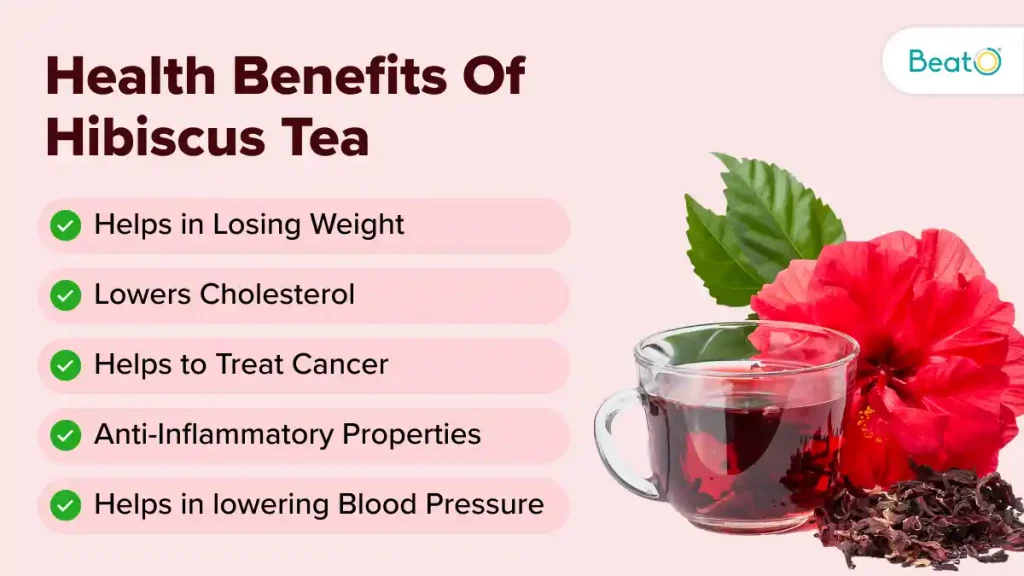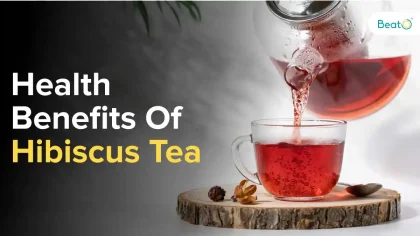Hibiscus sabdariffa or Hibiscus is a plant discovered in North Africa and Southeast Asia and is currently found in many tropical and subtropical regions. The plant is used as food and medicinal by people all over the world. The genus Hibiscus, part of the Malvaceae family, has hundreds of species, each with distinct qualities and possible uses in medicine. Of them, Hibiscus sabdariffa, sometimes referred to as Roselle or Red Hibiscus, is highly prized in herbal medicine and culinary arts due to its many health advantages and adaptability in the kitchen.

What is Hibiscus Tea Plant?
Hibiscus is a popular tea plant that is also known by the names roselle, sorrel, and zobo. To make hibiscus tea, one needs to soak the plant’s red, dried calyxes in either hot or cold water. The dried calyxes are also commonly used in culinary, including the preparation of vegan tacos, jam, and hibiscus syrup. Dried hibiscus can also be used to improve the taste and colour of drinks. Hibiscus is known for its stunning deep red colour, which is attributed to a red-blue pigment called anthocyanins, which is highly concentrated in the red calyxes that lie beneath the flower and have antioxidant qualities.
Also read: A Comprehensive Guide On How to Control Diabetes
We Bet You Won’t Be Aware Of These 8 Hibiscus Tea Benefits

Hibiscus tea benefits include balancing blood sugar levels, anti-inflammatory properties, weight loss, high nutritional value, etc making hibiscus tea a great addition to your diet. Here in this article, we will discover the health advantages of hibiscus while tracking its historical cultural significance and botanical ancestry. Originating in ancient Egypt and China, hibiscus is a timeless symbol of holistic healing and botanical perfection, widely used in Ayurvedic and traditional medical systems worldwide.
1. Nutritional Value of Hibiscus Tea
When it comes to Hibiscus tea benefits, its nutritional value can’t be ignored! Here is the bifurcation of all the important nutrition:
| Nutrition | Value |
| Water | 99.6 g |
| Potassium | 20 mg |
| Phosphorus | 1 mg |
| Calcium | 8 mg |
| Zinc | 0.04 mg |
| Sodium | 4 mg |
| Manganese | 0.477 mg |
| Choline | 0.4 mg |
From this table, we can conclude that Hibiscus tea comes with a lot of nutrients and offers a refreshing and nutritious beverage option packed with vitamins, minerals, antioxidants, and other beneficial compounds.
Also read: Nutrition And Food Plant Powered Protein: Best Vegetarian Protein Rich Food For A Balanced Diet
2. Helps in lowering Blood Pressure
Blood pressure in your arteries rises as a result of hypertension, overtaxing your heart and raising your risk of heart attack and stroke. The hibiscus flower has been used historically to control blood pressure. Hibiscus may have properties similar to those of an ACE inhibitor. Angiotensin-converting enzyme (ACE) inhibitors are a class of drugs that are frequently given to lower blood pressure by blocking this enzyme’s ability to regulate blood pressure. Although hibiscus does not work in the same way as prescription ACE inhibitors, some of its constituents may have similar benefits, including lowering blood pressure.
Hibiscus has the potential to lower blood pressure, however, it’s important to remember that each person’s reaction is unique. Furthermore, you should always see a healthcare provider before using hibiscus tea or supplements in place of prescription drugs for hypertension.
3. Helps in lowering Blood Sugar level
Studies have indicated that the polyphenols in hibiscus tea benefits may minimise blood sugar levels by preventing the activity of enzymes such as α-glucosidase and α-amylase. Hibiscus can help lower the pace at which glucose is released into the bloodstream by slowing down the digestive tract’s conversion of carbs into glucose, which prevents sharp rises in blood sugar levels.
Insulin resistance and type 2 diabetes are frequently associated with higher levels of triglycerides and cholesterol. Research has demonstrated that hibiscus can raise HDL cholesterol (the “good” cholesterol) and decrease LDL cholesterol (the “bad”) and triglycerides. Indirectly, hibiscus promotes better blood sugar regulation by enhancing lipid profile.
Also read: Curling Towards Success: Mastering Leg Curl Exercises- Form, Benefits & Variations
4. Anti-Inflammatory Properties
Hibiscus tea’s abundance of antioxidants, including beta-carotene, Vitamin C, and anthocyanins, gives it anti-inflammatory properties. These antioxidants help the body resist dangerous chemicals known as free radicals, which can cause cancer, heart disease, and diabetes. Research on both humans and animals has demonstrated that hibiscus tea reduces inflammation, which is connected to the emergence of numerous diseases, including rheumatoid arthritis, cancer, heart disease, and Alzheimer’s disease.
Moreover, hibiscus tea has been shown to lower blood pressure. While hibiscus tea has many health advantages, it is crucial to remember that further research is necessary to completely understand how it affects different health conditions.
5. Helps to Treat Cancer
Hibiscus tea’s abundance of antioxidants, including polyphenols and anthocyanins, gives it anti-cancer qualities. These protective compounds, known as free radicals, aid the body in fighting off dangerous molecules that can cause a host of illnesses, including cancer. Hibiscus flower extract has been shown to interact favourably with conventional chemotherapeutics including taxol, cisplatin, and tamoxifen while also specifically inducing apoptosis in breast cancer cells. Furthermore, hibiscus extract has been shown to improve chemotherapy therapies’ activation of apoptosis, suggesting that it can be used in adjuvant therapy in conjunction with chemotherapeutic treatments to lessen side effects associated with chemotherapy.
Also read: 5 Unique Sources of Protein to Explore on World Protein Day 2024
6. Helps in Lowering Cholesterol
Hibiscus tea benefits may lower levels of harmful cholesterol, which include very low-density lipoprotein, total cholesterol, and low-density lipoprotein. Additionally, it might increase HDL, or good cholesterol, levels. This could be because hibiscus tea has antioxidants. When compared to other teas and placebos, hibiscus tea has been proven to lower levels of low-density lipoprotein (LDL) cholesterol. Studies have also shown that by raising HDL cholesterol and lowering triglycerides, LDL cholesterol, and total cholesterol, hibiscus tea can help lower blood fat levels, which are a risk factor for heart disease.
7. Helps in Losing Weight
Hibiscus tea has several different ways to help with weight loss. It has substances including flavonoids, phenolic compounds, and anthocyanins that may aid in natural weight loss. Hibiscus tea has demonstrated promise in lowering total body fat, encouraging the burning of abdominal fat and preventing weight gain.
Furthermore, hibiscus tea has fat-blocking properties that help with weight management. Furthermore, by promoting general health and metabolism, hibiscus tea’s anti-inflammatory qualities may aid in weight loss. Although more studies are required to completely comprehend the precise effects of hibiscus tea on weight loss, preliminary results point to the tea’s promise as a natural tool for weight management and general health promotion.
Also read: How To Reduce Blood Sugar Levels Immediately? A Step-by-Step Guide
Conclusion:
In conclusion, Hibiscus is a powerful botanical with numerous health benefits. Its vibrant blooms and rich bioactive compounds, such as flavonoids, anthocyanins, and polyphenols, contribute to its anti-inflammatory properties. Moreover, Hibiscus tea benefits also help regulate blood pressure, manage blood sugar, and support cardiovascular health. This versatile herb can be used as an herbal remedy or added to various dishes. As we continue to explore its potential, it becomes clear that Hibiscus is a testament to the positive connection between nature and human health. Enjoy a refreshing cup of tea or incorporate Hibiscus into your meals for a nourishing way to care for your body and soul.
Disclaimer: The content of this article is compiled information from generic and public sources. It is in no way a substitute, suggestion, or advice for a qualified medical opinion. Always consult a specialist or your own doctor for more information. Beato App does not claim responsibility for this information.
Discover top-tier diabetes care with BeatO’s Chief Clinical Officer,Dr. Navneet Agarwal. His expertise in Diabetes ensures personalised guidance for overall health. Try out a smartglucometerand keep track of blood sugar levels now.




